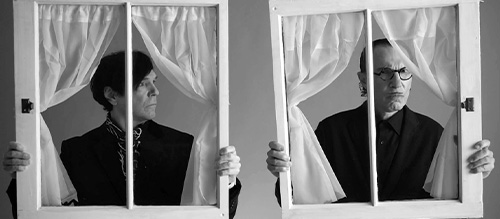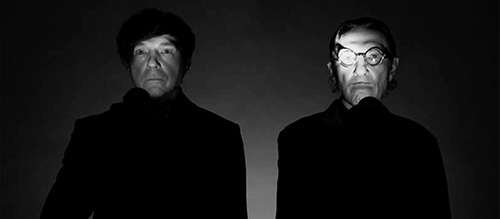The Sparks Brothers (2021) Review
The Sparks Brothers (2021)
Director: Edgar Wright
Starring: Ron Mael, Russell Mael, Edgar Wright
Whether you’ve seen one Edgar Wright film or his entire filmography, one thing is apparent: his love of music. Whether that be shown through the likes of Shaun of the Dead and Hot Fuzz, or through his more music-centered films such as Baby Driver and Scott Pilgrim vs the World, it is clear that the man loves music, with the soundtracks of his movies being consistently lauded for their quality and their impact on the films themselves, particularly with regard to how each of them are edited. Wright is a self-confessed music fanboy and this is no more apparent than through his social media accounts, each of which he often updates with excellent curated Spotify playlists, from Top 50 of the Year collections to playlists specific to David Bowie and Ennio Morricone. Over the past few years, one of Edgar Wright’s most vocal loves has been that of Sparks, which first became obvious with his original Sparks for Beginners playlist (now “The Sparks Brothers – Official Film Playlist”). The famed director’s love of music – and specific love of Sparks – makes him the perfect choice for director of a documentary on brothers Ron and Russell Mael aka The Sparks Brothers.
Sparks are a famously mysterious band, as pointed out in the trailer when Julia Marcus offers the soundbite statement that Sparks “are a band who you can look up on wikipedia and know nothing!” Given that the story of the Mael brothers is shrouded in mystery whilst also having lasted fifty years, one must take a well thought out approach in portraying the story of their lives and that of the band. Wright’s approach could be argued to be formulaic due to its structure in going from album to album in chronological order, yet the story of Sparks simply does not allow for the structure to seem placid, with each of the band’s albums (and consequentially the periods in each of the Mael’s lives) being unique in their own way. Wright bringing some structure to the insane story of the band actually allows the whacky real-life narrative to be told in a cohesive manner.
At a runtime of 2 hours and 20 minutes many would feel as though The Sparks Brothers is rather long for a documentary (though fans of Mark Cousins’ work might disagree), yet the sheer volume of information Edgar Wright is able to tell throughout this runtime is astonishing; The Sparks Brothers covers all 25 Sparks albums, how they were made, their legacies, best songs, music videos, press at the time, etc., whilst also covering the upbringing of the brothers, how they came to love music, stories of their first bands, and even going so far as to cover multiple failed film projects as well as their famous 21 concerts in a row, playing every album of theirs in full. Multiple moments in the careers of the Spark Brothers would be worthy of feature length documentaries themselves, but somehow Edgar Wright manages to tell it all in one movie whilst never conveying the feeling that any one section receives favour over another.
While the volume of information being told at any one time throughout The Sparks Brothers is enough to save the film from dragging, Paul Trewartha’s editing of the documentary keeps the film moving at a brisk pace with a tempo and rhythm almost as catchy as those found within the music of Sparks. Much of this is helped by Wright’s excellent choices of Sparks songs to play throughout the documentary, all of which further compliment each era of the band, bringing more meaning to the story being told and vice versa.
On top of this, the band have been so influential throughout their careers that the documentary also works as its own mini-history of music over the past half century. Even through moments in time in which Sparks were far removed (ie, the Punk explosion of the 70s), the documentary fills in the blanks, adding layer after layer to an already rich offering.
Despite the truly fascinating story, Wright’s excellent use of the band’s entire discography, the editing, the pacing, and the sheer volume of information told in the film’s runtime, perhaps the greatest aspect of The Sparks Brothers is its use of talking heads. This is something the film itself pokes fun at, its own trailer featuring a line from the brothers that states: “we didn’t want to do the standard documentary full of talking heads […] it would become too dry”, each doused in water shortly thereafter. By conducting the interviews himself, Wright (subtitled as “fanboy” in the doc) successfully creates an atmosphere of Sparks fans nerding-out together, allowing for each interview to seem truly natural and for every single interviewee’s passion for the music to shine through. Vitally, Wright has assembled a brilliant and varied cast of interviewees that spans from fellow musicians to actors, writers, journalists, directors and fans, showing the true reach of Sparks. As well as this, the sheer number of interviews filmed for the movie allows for each album and era of the band to be represented by their own unique set of talking heads.
With The Sparks Brothers it is blatantly apparent that Sparks were the best subject matter for Edgar Wright to cover in his first foray into documentary filmmaking, and equally that Wright was the best director to make a long-awaited documentary about the Mael brothers. The passion of the director, and everyone else involved, never fails to shine through in The Sparks Brothers, just as the genius of Sparks themselves never seems to fade.
This documentary is an impeccable 2-hours-plus of pure joy.
23/24
Recommended for you: Edgar Wright Movies Ranked



